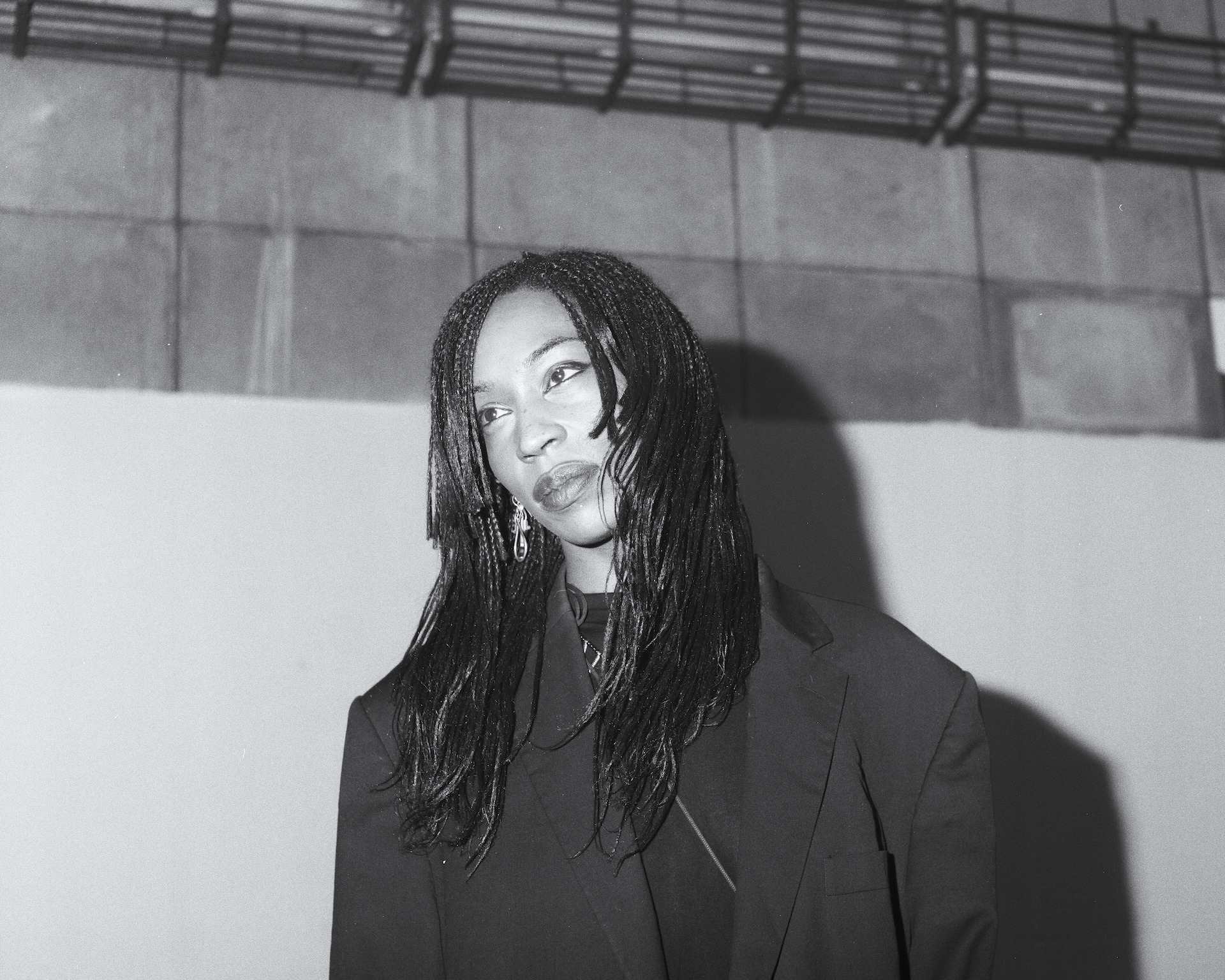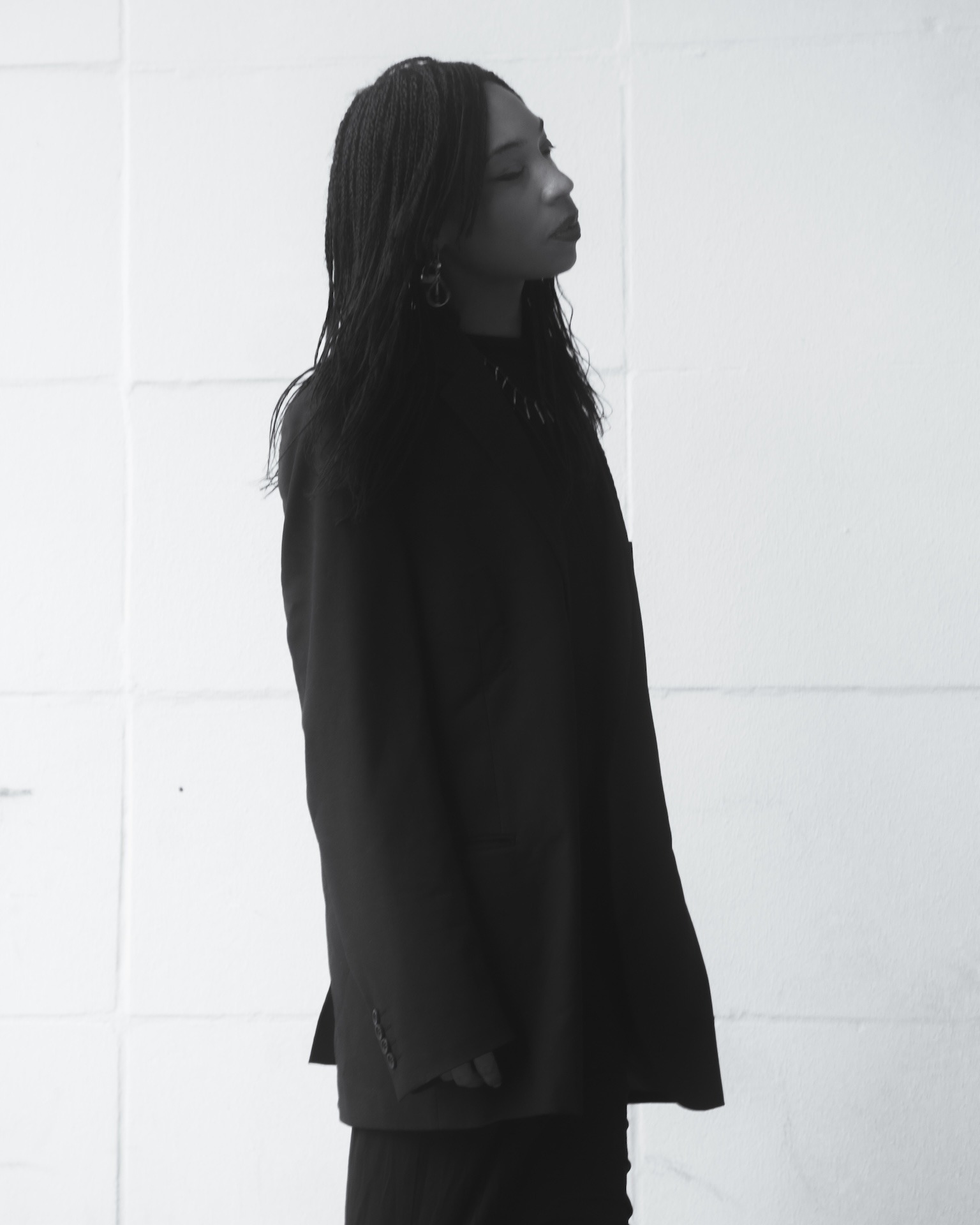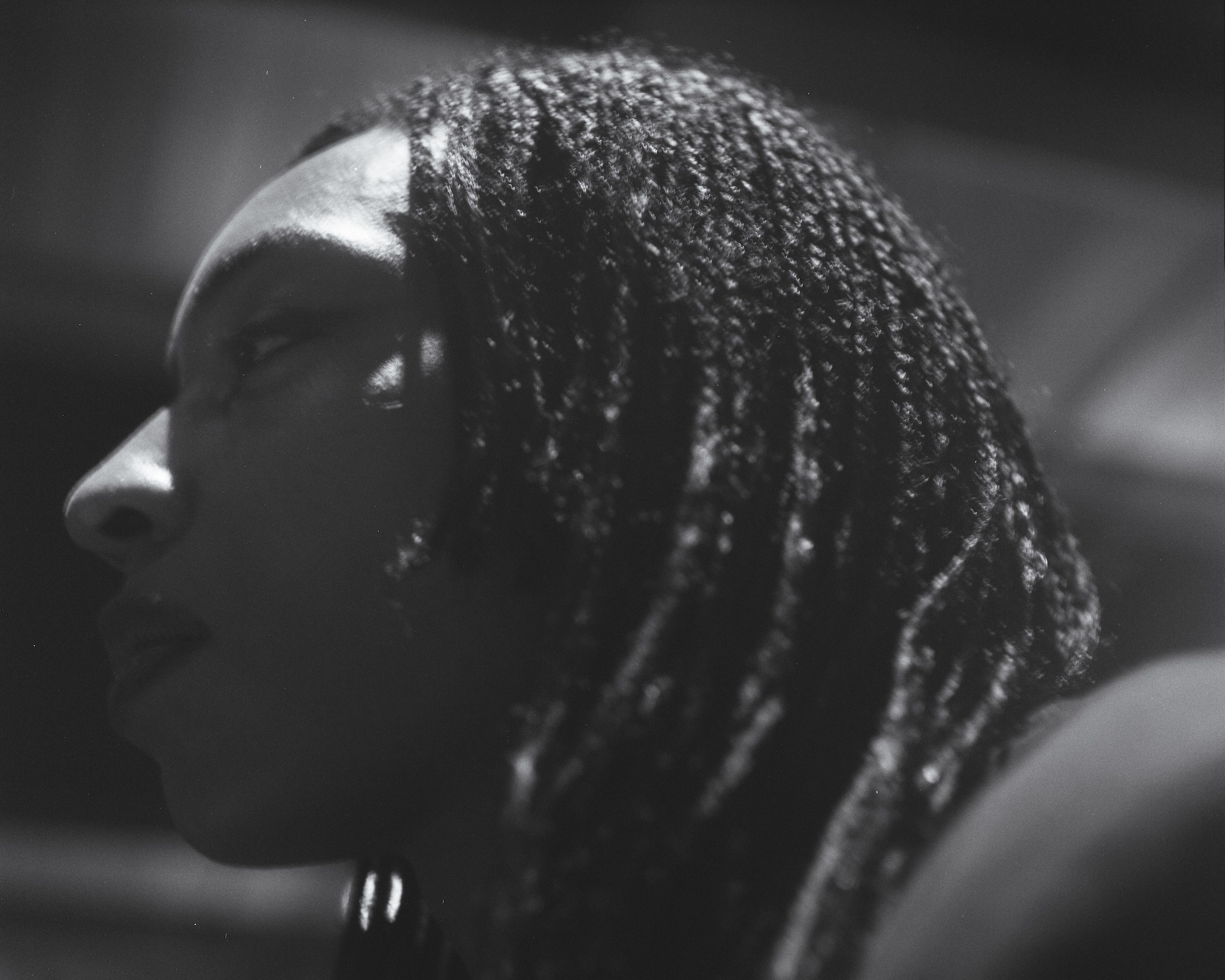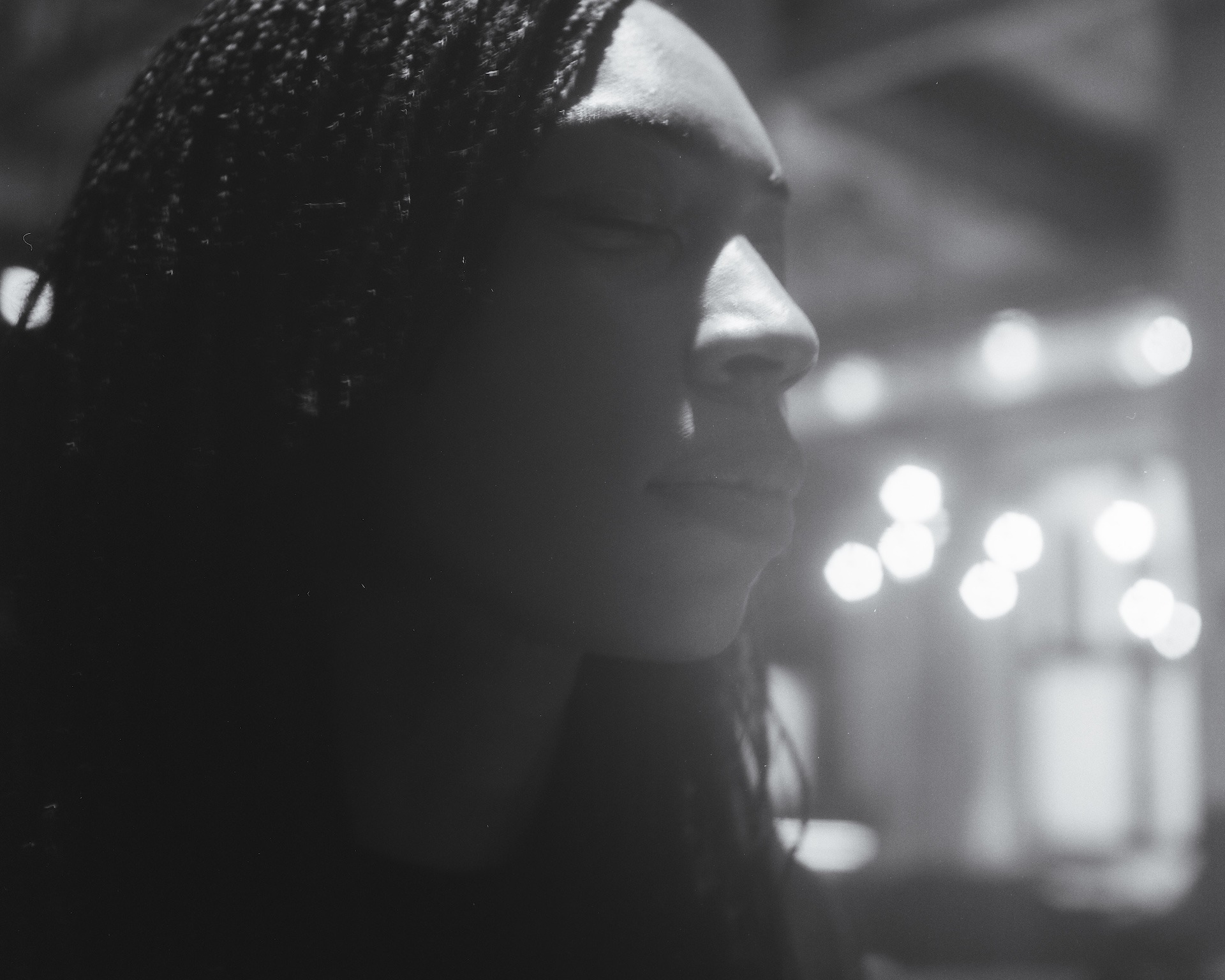“sound as a portal towards other dimensions and other forms of self” – An interview with Nkisi (Part I)

“Thinking about healing and vibrational connections”
Let’s start with your first release on your own label INITIATION “INT001”, which for me was the first conscious encounter with your work, besides knowing the label NON worldwide. It was interesting because it barely featured any melodies. It was quite abstract and delving into realms of unknown areas of what electronic music could be today. So I’d be curious, what your approach was in producing that?
I think music is really an amazing space to express things beyond language. I feel sometimes that language can be quite limiting in expressing ideas. I’m really interested in this idea of how to push sound in a way that it brings an initiation for the listener. Is it initiating the listener towards, like you say, unknown sounds, unknown experiences? But then also being very aware about what can be triggered with sounds.
What is really interesting with using sound as a medium is that you can work with sonic markers – what certain sounds mean in the bigger picture of a socio-political context. But also everyone has their own inner space and own inner experience, so I think it can also fill in the gaps that I leave open in the music.
It maybe feels weird to say that because the music is so intense and so dense, but I think I do try to leave space for the experience of the listener to also get a place. I think it’s really interesting to think about how music can exist in a way where it can do something for the collective, but also for the individual person.
Thinking about healing and vibrational connections and more of sound as a portal towards other dimensions and other forms of self.
Do you approach it also as some kind of world-building in a way? If you say that it’s opening some gates to other dimensions. Do you have some drafts of a world that would surround what you’re doing musically?
Yes, definitely. I think ideas of building are very important for things because to go back to my personal trajectory, in my spiritual world. I’ve also started thinking a lot about my own initiation because for me, diving into the ideas and the cosmology is what opened up when I made the album. It was also showing me that a lot of the world building had to start from a space where I had to also understand that the world that’s around me is connected to the way how I view the world and that the way how I view the world is connected to how I’ve been educated, the conditioning, colonial histories that are connected to my identity.
I went into these indigenous and non-Western ways of seeing the world which then interestingly also opened up a whole new sonic universe because a lot of the non-Western and Indigenous kind of worldviews and cosmogonies are very sonic. They all come from a very sound focussed space. I think Western cosmogony is very much focussed on the eyes and on “everything that you see is”. To not go too much into the esoteric but focus on the illusion. And whatever they call “Maya, the illusion of” that’s projected from source, from the invisible.
“sound is consciousness”
So one of the things that are important to me is definitely thinking not too linear. Sometimes you precede yourself. I feel that with music, when making records, I always precede myself, maybe not really understanding what I’m doing. And then it makes sense a few years later, or when I dive deeper in the practice.
I’m also engaging in archives: archives in Indigenous sound studies and African sound studies, in spiritual scripts, ancient sonic texts. I’m channelling spiritually to the improvisations that I do with rhythm. That’s when I realised that actually sound is consciousness, you know? Sound in itself has consciousness and yes, it’s world building. It’s me directing and guiding the sound somewhere. In the practice of making a track, I’m not choosing where it is going. So maybe I’m just a vessel that is there so the sounds can transcend through my body into the gear and then the sound actually decides which are the worlds that are being built. Which I think becomes very interesting, but then also makes it sometimes a bit harder to put words on them.
But then for me it’s also something that has been quite difficult. Coming from a space that tries to de-eroticize or to rationalize artistic production. For me it’s totally fine to have this relationship with the music where I don’t really know what I’m doing, but then it all falls into place. And it becomes more me reading the music after it came into existence. In this way knowledge production is basically the composition: I’m actually at the same time making it, but also the audience of it.
That’s a beautiful description of saying that actually the sonic forces are forming your way, where you go, so to speak. And so you would say that on the one hand you have this preconceptions of what you’re trying to do, but at the same time, there is this encounter with all these unknown things that can happen in the process of producing music that just make it possible for you afterwards to actually understand what you’ve done.
Exactly. But then on the other hand it may be the seeking, because part of this idea of initiation is also diving into these ideas of secrecy and of secret rhythms that are embedded inside a lot of the music that we encounter, even in pop music and techno, or in club music.
A lot of the rhythms that we encounter refer back to seven spiritual African rhythms. It’s ancient rhythms. If you then think about these rhythms as consciousness, it becomes interesting to see how they manage to intrude and be part of society, even if they come from a place of colonialism, transatlantic slave trade, or whatever happened in other indigenous practices and worlds on Earth, or even what we see is happening now.
Obviously a lot of material structures have been erased and destroyed through colonialism. And colonialism is linked to what I like to call the “unfinished project of capitalism”, because it’s still going on. But then it’s also interesting to look at these immaterial systems and structures, technologies – because I like to look at rhythm as technology – to actually look at rhythms as systems that have not been able to be destroyed. They managed to intrude our systems, our lives.
So when I started looking at it like that, playing in a techno club became very interesting. Cause then a few hundred people will be totally immersed in these rhythms that can be traced back to ancient indigenous and non-Western rhythms. And even though certain people have been erased or oppressed these rhythms are still there and they are still effective. And what are they actually doing?
“rhythm as technology”

I think it’s my duty to act as a vessel for these higher forces. How I’m dealing with these archives, means also thinking about how to keep them alive and how to keep them around.
In my practice I’m trying exactly that. And it’s interesting because the way they materialise, even if I’m listening to some ancient drumming or some specific rhythms, they kind of express themselves in very futuristic ways. So then it also becomes this thing where it’s like, am I getting guidance from the past or am I getting guidance from the future? I’m really interested in this idea of ancient futures also because part of the colonial project is to colonise time and I think for a lot of indigenous and non-Western peoples, it has been the separation of traditions from the idea of technology.
So I think that’s something that I’m very much willing to put to the front in my work to really be like “hey, these rhythms are forms of technology. These specific sounds, these ways of storytelling are technology. Because obviously that’s also part of the colonisation of peoples to be like “oh, you don’t have a written story” or to think because a story is hidden in songs that makes it primitive. But no, those are technologies. It’s very complex to be able to make songs and create symbolism in mythology that encompasses crazy scientific codes and crazy scientific ideas about how the universe is put into place in that way.
With globalisation we have a colonisation of how future will develop. To make sure that nothing that is uncontrolled will manage to be part of the future. Would you say that with music, especially if you’re using polyrhythms, if you diverge from a simple linear understanding of time, that there are ways of tackling this problem?
Definitely. To be totally honest, it’s always been about this idea of polarity. So I think sound has a revolutionary position, in fact — because it can create new worlds. That’s becoming more and more important, especially because a lot of the ancient texts or ideas I’ve been encountering talk about things that are now starting to emerge in Western science: things like what vibrations can do, sound healing, even the opening of portals, or time travel through sound and sound vibration.
I think we’re increasingly moving toward an understanding that sound, as a medium, holds a lot of possibilities. But then there’s the other side of it, too — and maybe that’s something I’ve always unconsciously felt — which is why alternative music is so important. Music that exists in opposition to more commercial or mainstream things. Because I think mainstream music might become even more powerful in influencing people and society — and maybe not for the better.
So I find it really interesting what can happen. Obviously, I’m kind of a self-taught musician — my background is more in image-making. So I already came into this situation making music “the wrong way,” or at least not the ‘right’ way. In a way, that was liberating, but it also forced me to really pay attention to my own responses to the music I was making — to use my body, to try out the sounds on my body: I don’t really know if I’m doing this right, or if the rhythm structure is right, but it’s generating an emotional response. And that means I’m onto something, you know? And sometimes, the danger with professionalization — and the tension between being an amateur and becoming skilled in something — is that we start to limit ourselves by thinking there’s a “right” way to do music, or whatever else.
I’m really interested in imagining the future in terms of what kinds of sounds could be created and invented. But for me, what’s also important is not just looking at sound for what it brings out aesthetically — but understanding sound as a tool. Conceptually, sound can be a tool for bringing people together, a tool for initiating conversations. Especially when we think more and more about the state of the world — this growing opacity, this sense of secrecy — maybe there are conversations we can no longer have in public. Let’s have them in the music, let’s have them in sound.
And then, going back to the label — that was also really important for me: this idea of initiation happening through listening. That by engaging with the music, people wouldn’t just hear it, but also think. If I were to have a catalogue of music, then there would also be an understanding of a kind of sonic language — one where listeners could decode the messages embedded in the music. It would become a form of communication. I was thinking specifically about secret societies, and what that might mean — perhaps even the possibility of building your own secret societies, formed around shared ideas about what the world could or should become. Or simply opening space for sound to build the world we need. Cause sometimes we don’t really know what we need.
“ sound holds the potential to build”
So yeah, I think a lot about that — about how sound holds the potential to build. And how that leads to an interesting relationship with how we might understand its sacredness. I’ve been thinking about what it means to be in this musical space, to create rhythms, to have these layers of rhythms on top of one another, creating invisible sonic architectures. And this sonic architecture is basically the impulse, like a kind of temple, where every individual participating in the ritual can enter into communion with energies beyond ourselves. But at the same time, it offers the possibility to shape the world we actually want to build together.
Sometimes I feel that, I’m not fully aligned with certain structures. There are ways of partying and clubbing that I don’t completely stand behind or believe in. Sometimes those spaces can drift into something nihilistic, even dangerous. It’s spaces that can also hold forces that may not be working toward the good. But, I think that because we are in these spaces where we can all come together and where our hearts can syncopate and connect with one another, and and to see the potential of what can be done in these times, in these spaces. Maybe that moment connects to what, in an indigenous or non-Western context, would have been a ritual or a ceremony. A space where people come together for collective healing, to ask for guidance, or to engage in some kind of divination — to look into the future. Maybe that can be connected to whatever would have been a ritual or a ceremony, maybe in an indigenous or non-Western kind of context, and people would come together for healing of the collective or asking for specific guidance or thinking about looking into the future, divination practices.
So I also like to think about how we can approach these so-called modern forms of gathering — which are quite rare, I think, because we live in such individualised societies. And what is the potential in those moments? That’s something I’ve experienced from being on stage — those moments where you really feel connected with every single person in the room. You look up and everyone is swaying, left to right, carried by the rhythm — and it’s just like: “Wow.” It’s humbling as an artist to witness that. But it also shows just how powerful music can be to be able to do that.

“the power of being in the shadows, the power of being outside the centre”
So is this process of healing, somehow what made changes or more recent changes in what your musical approach is?
Yeah, definitely. It’s this kind of double thing — it’s about how to be aware of these things. I think it’s about being wrong. But I think I would define it more as being disobedient. And I feel in many things — also because I obviously have problems with authority — that this place of being disobedient, or coming from a true disposition of disobedience, already includes a process of criticising the norm. That’s inherent in taking on this position, in trying to force things to be seen differently — which is an interesting place to be in.
It’s like you’re always moving within this tension of being against something external, or embracing this idea of being an outsider. And I think that’s been with me — obviously from how I grew up and from my personal history. It’s been a space that, again, through this form of healing you’re talking about, becomes something else: something that may have been traumatic or hard to embrace — especially when you’re young and don’t understand that those things are bigger than you as an individual. That it’s more systemic. But then, when you start to see the power of that — the power of being in the shadows, the power of being outside the centre — it becomes liberating. And I feel that even in my musical journey, it becomes interesting, because it’s also another way I connect with my audience or with the people who follow my music.
It really comes from this place where people, through all forms of human expression, exist in this world. It becomes a space where I also learn from the people who listen to my music — where it becomes a dynamic exchange of knowledge. It’s not just me showing up with my story and my vision. It’s also about how people respond. And I always try to be aware of that and open to that space, because it becomes a shared space of support and healing. The way people react, or describe the music — when they tell me what it triggers in them, emotionally or otherwise — that’s part of it. And then I think it’s also really interesting because making music and living in music always involves this tension between the heart and the mind, and the body and the mind.
The project was obviously also based on this idea of fear or whatever it is the system fears, being embedded in ideas of darkness. Even when I look into the meanings of my own name, Nkisi, or the things I’m studying, like Vodoun and its spiritual practices — all of that has been demonised. And that leads into thinking about demonology, and what that even means when you look back at the history of the witch hunts and who the witches actually were. So it becomes really interesting to think about. And I think that’s something I’m constantly trying to do — because people often don’t want to look deeper. It’s easy to say, “Oh, you’re just into the obscure” or “You like darkness,” whatever “darkness” means.
But for me, it’s a deeper kind of investigation and looking into also this more generative space of the unknown. And to really look at that, it’s actually this idea of thinking about Cosmos, thinking about the black hole, about whatever could be the cosmic womb and whatever, that as a concept could be generative.
“sound exists outside of the gaze”
I’m reading a book right now that I find really interesting, it talks about the Black Madonna, also involving Christianeity, and it’s also like going back to this idea of what is this kind of darkness and what is this darkness that people try to reject? Sometimes that’s a struggle, because staying within positions of identity can also be difficult, at least for me. Because when you stay within a fixed idea of identity, it’s already shaped in relation to a normative identity. And I think that ties back to this idea of being disobedient. Because it raises questions like: “Do I only exist because the opposite of me exists? Can I exist independently of that binary? What does it mean to exist outside of a push-and-pull dynamic with some centre or norm?”
These are things I think about a lot. And that’s why I feel this position of disobedience makes more sense to me — because it comes from a space where energy and sound also exist outside of the gaze, I guess. I think about that even when I perform. I try to go a bit deeper into the idea of what performance actually is.
I often turn to ancient archives, thinking of performance as a kind of ritual — one that breaks the binary of performer and audience, where those roles are more entangled, where people are active participants.

Obviously going to these references from the ancient archives, thinking about performance as a ritual where it’s not about this binary of the audience and the performer where these things are a bit more entangled and where people are active participants. Do I come on to the stage and do I start to music or does the music already start and the people, you know, encounter the world already before?
So then the question is: how is that world built? Is it built from the gaze of the audience, or the gaze of the oppressor — of the colonial, capitalist system? Do I only exist once the system sees me and accepts me? Or do I always exist — regardless? That tension is important. And at times, it can be tricky. Because how do you still function within that? A lot of this is abstract. It works in a space where you don’t need to pay bills, where survival within a financial system isn’t a concern. But in reality, it becomes difficult to translate that — because I want to work not only for financial reasons, but I also want to be part of a system where I can perform, where my work reaches the people it’s meant to reach. And one of the beautiful things about electronic music — or certain forms of electronic music — is that, hopefully, we can continue to build spaces where there is still a need, still an audience, for music that is more disobedient.
Find the 2nd part of the interview here.

This article is brought to you by Struma+Iodine as part of the EM GUIDE project – an initiative dedicated to empowering independent music magazines and strengthen the underground music scene in Europe. Read more about the project at emgui.de
Funded by the European Union. Views and opinions expressed are however those of the author(s) only and do not necessarily reflect those of the European Union or the European Education and Culture Executive Agency (EACEA). Neither the European Union nor EACEA can be held responsible for them.